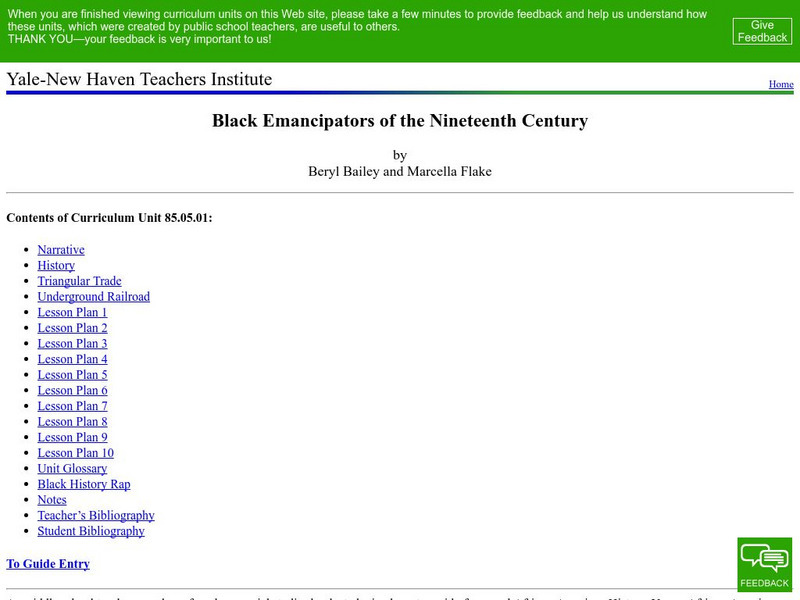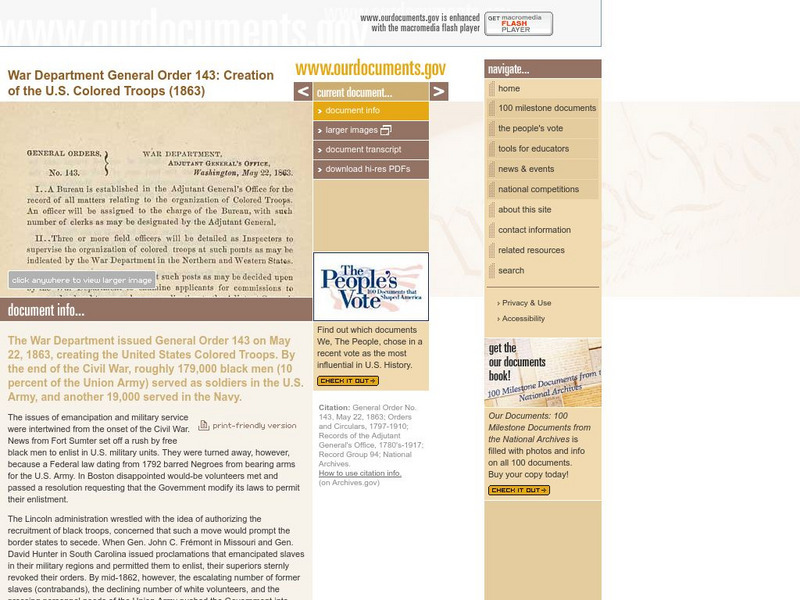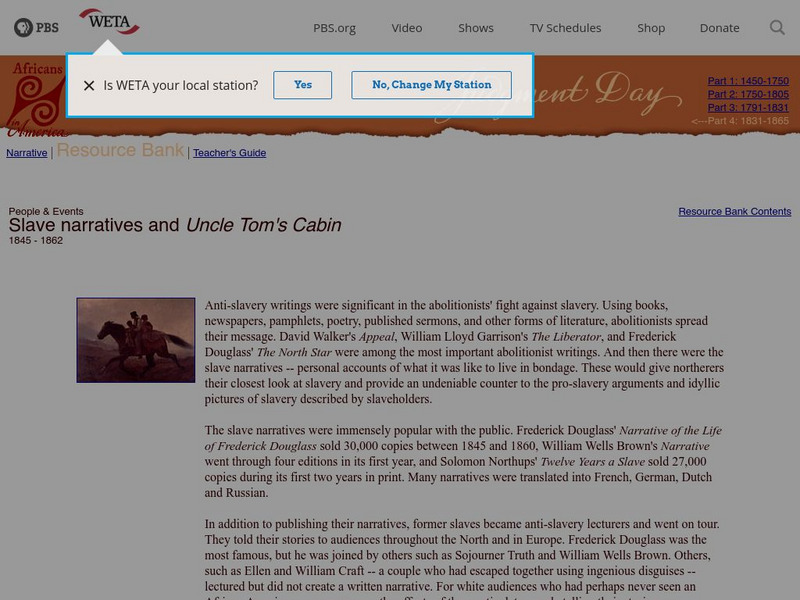Hi, what do you want to do?
PBS
Pbs Learning Media: Primary Source Set: The American Whaling Industry
This collection uses primary sources to explore the American whaling industry.
PBS
Pbs Learning Media: Frederick Douglass: Orator, Editor, and Abolitionist
Through two primary source activities and a short video, understand how Douglass stood firm in his beliefs and rose to prominence, and explore the importance of literacy in his life.
National Humanities Center
National Humanities Center: Toolbox Library: Frederick Douglass: Appendix to Narrative of the Life of Am. Slave
The appendix to Frederick Douglass's well-known autobiography in which he castigates Americans' embrace of Christianity as hypocritical.
National Humanities Center
National Humanities Center: Toolbox Library: Race Problem, Making of African American Identity: V. 2
A poem, an address, and a painting that illustrate black political struggle in late-nineteenth-century America. This series of resources characterize "the Negro Problem" as "a concrete test of the underlying principles of the great...
National Humanities Center
National Humanities Center: Toolbox Library: Education, Making of African American Identity: V. 1
Nineteenth-century accounts and twentieth-century recollections by former slaves of the absence of and obstacles to education for African Americans. Links to narratives of freed and newly freed slaves are provided.
National Humanities Center
National Humanities Center: Toolbox Library: Religion: Frederick Douglass
The National Humanities Center presents collections of primary resources compatible with the Common Core State Standards - historical documents, literary texts, and works of art - thematically organized with notes and discussion...
Digital History
Digital History: Three Responses to Slavery [Pdf]
This site looks at how slaves Josiah Henson, Frederick Douglass and Sojourner Truth each responded to slavery in unique ways. Read their own words.
Digital History
Digital History: The Life Cycle of a Slave [Pdf]
Read excerpts from these slave and ex-slave narratives to find out what the life of a slave was like through all stages of life--childhood, marriage, and old age. See the heartbreak of mothers being separated from their children, and...
Digital History
Digital History: Methods of Controlling Slaves [Pdf]
Slave masters felt that controlling slaves was a necessity. Read about three ways slaves were controlled in the slavery system, and read an account by Frederick Douglass about how his master, in particular, kept his slaves in line. [pdf]
National Humanities Center
National Humanities Center: Toolbox Library: America in 1850: Frederick Douglass
The National Humanities Center presents collections of primary resources compatible with the Common Core State Standards - historical documents, literary texts, and works of art - thematically organized with notes and discussion...
National Endowment for the Humanities
Neh: Edsit Ement: Introducing the Essay: Twain, Douglass and American Non Fiction
This lesson plan serves as an introduction to American literary non-fiction writing and focuses primarily on teaching some basic approaches to recognizing rhetorical strategies adopted for persuasive effect in essays and non-fiction. The...
National Humanities Center
National Humanities Center: Teacher Serve: Frederick Douglass and Harriet Jacobs: American Slave Narrators
Lucinda MacKethan, English professor at North Carolina State University, offers a comparison of two classic slave narratives: Frederick Douglass's 1845 Narrative of the Life of Frederick Douglass: an American Slave and Harriet Jacobs's...
National Endowment for the Humanities
Neh: Edsit Ement: From Courage to Freedom
In this lesson plan, students will consider From Courage to Freedom. Worksheets and other supporting materials can be found under the Resources tab.
National Endowment for the Humanities
Neh: Edsit Ement: Lesson 1: From Courage to Freedom: The Reality Behind the Song
In this lesson plan, students will consider Lesson 1: From Courage to Freedom: The Reality behind the Song. Worksheets and other supporting materials can be found under the Resources tab.
University of Virginia
The University of Virginia Library: Frederick Douglass: The Color Line
Full text of the Frederick Douglass essay "The Color Line."
Yale University
Yale New Haven Teachers Institute: Black Emancipators of the 19th Century
A lesson unit on the people and movements that fought to abolish slavery. Looks at the Triangular Trade, and at the Underground Railroad and famous abolitionists. Includes a play about emancipation, a black history rap and a trivia quiz...
US National Archives
Our Documents: War Dept General Order 143: Creation of Us Colored Troops (1863)
Original document that permitted the recruitment of black troops during the Civil War. Read about events and issues leading up to and following the 1863 establishment of the Bureau of Colored Troops.
Library of Congress
Loc: African American Mosaic: Black History and Culture
Online version of a Library of Congress exhibit, covering information about black history, including colonization, abolition, migrations, and the WPA. It is multimedia and contains hundreds of primary source documents.
C-SPAN
C Span American Writers: Narrative of Frederick Douglass
A brief summary of The Narrative of the Life of Frederick Douglass. Also includes an on-line text of the work as well as links to other informational websites.
Penguin Publishing
Penguin Random House: "Frederick Douglass American Slave" [Pdf]
Teacher guide for Douglass's biography features 24 pages of chapter-by-chapter study questions, quotations, and activities. Valuable post-reading activities as well as methods for eliciting student responses also included. This is a .pdf...
PBS
Africans in America: Slave Narratives and Uncle Tom's Cabin
Slave narratives were an effective tool to spread information about what slavery was really like. Perhaps the most widely read literature about slavery happened to be written by a white woman, Harriet Beecher Stowe. Read about the impact...
PBS
Africans in America: Harriet Jacobs
Read about Harriet Jacobs'(1813-1897 CE) childhood as a slave and her escape from slavery -- the experiences from which she created her slave narrative, "Indidents in the Life of a Slave Girl," which "Was one the first open discussions...
Other
Douglass Archive: What to the Slave Is the 4th of July?
This site from the Douglass Archive provides the complete text with an introduction to the speech and footnotes.
Other
Digital Text: My Escape From Slavery
This site provides a narrative of Frederick Douglass' escape from slavery.





















